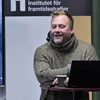damaged
Edward Page: Addressing future loss and damage associated with climate change
Edward Page, Associate Professor of Political Theory, University of Warwick ABSTRACTClimate change, by damaging the quality of life of populations already suffering from acute vulnerability and hardshi the adoption of measures of mitigation and adaptation and a ‘second-order injustice’ if the associated losses and damages arise as of these measures. Both forms of injustice involve ‘losses and damages’ arising that would not have occurred but for climate change but raise distinct normative problems given their diverging origins. This research seminar explores some key normative puzzles raised by the new ethics and politics of ‘loss and damage’ as it relates to both first-order and second-order climate change injustice. In particular, the lecture focuses on which normative principles should guide measures seeking to address first-order and second-order climate change injustices experienced by states and how (if at all) new forms of policy can be designed that respect these principles.

Workshop talk: The Duty to Compensate for Injustice as Applied to Reconstruction by Derek Matravers
Philosopher Derek Matravers from the Open University reads a paper he has written on the question of whether one should restore or simply leave damaged cultural heritage after a conflict has ended. Fr
Anders Sandberg: The Survival Curve of Our Species: Handling Global Catastrophic and Existential Risks
Anders Sandberg, Future of Humanity Institute, Oxford University ABSTRACTHow likely is humanity to be severely damaged by a global disaster, or go extinct? How bad would it be? This talk will review wo
Breakfast seminar: Cultural heritage in war
The destruction of cultural property in war zones is of pressing concern. The recent and on-going conflicts in the Middle East have featured both the deliberate, symbolic destruction of cultural artef
Cultural heritage, law and war
The destruction of cultural property in war zones is of pressing concern. The recent and on-going conflicts in the Middle East have featured both the deliberate, symbolic destruction of cultural artefThis seminar brings together speakers from philosophy, archaeology, political science and international law. Topics to be discussed include the protection of heritage as a just cause for war, identity wars, military policy and heritage, the relationship between heritage and violence, and compensatory duties for damaged cultural sites.
Completed: Predicting the diffusion of artificial intelligence
A framework for predicting the spread of AI applications.
Time to plan for the worst-case scenario
After two of the most damaging hurricanes in history affected the Gulf of Mexico just a few days apart, the impact of climate-induced catastrophes is finally getting some attention. However, in truth,
Countering Protection Rackets Using Legal and Social Approaches: An Agent-Based Test
Hindawi, Volume 2018, Article ID 3568085, 16 pages, doi.org/10.1155/2018/3568085. Abstract Protection rackets cause economic and social damage across the world. States typically combat protection rackets
Katherine Puddifoot: Stress, Trauma, Memory and Injustice: How Policies Wrong Rememberers
Venue: Institutet för framtidsstudier, Holländargatan 13, 4th floor, Stockholm, or online. Research seminar with Katherine Puddifoot, Associate Professor in Philosophy at Durham University. Her recent mnemonic form epistemic injustice

Mårten Schultz: Risk and responsibility
Legal responsibility comes in different forms. Private law deals with questions of responsibility for harm that someone causes another. The responsibility requires three things: That someone was harme








